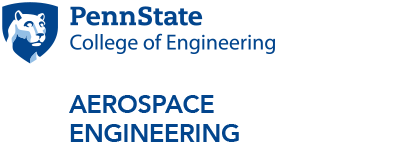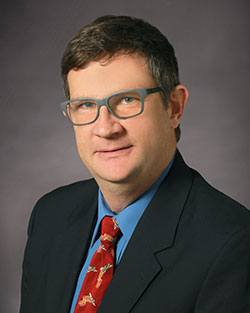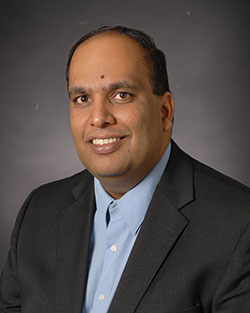Two new faculty members join aerospace engineering
8/3/2017
UNIVERSITY PARK, Pa. – The Department of Aerospace Engineering is proud to welcome Eric N. Johnson and Puneet Singla as its newest faculty members.
Johnson has been hired as a professor. He comes to Penn State from the Georgia Institute of Technology (Georgia Tech), where he was Lockheed Martin Professor of Avionics Integration in the Daniel Guggenheim School of Aerospace Engineering and director of the Georgia Tech UAV Research Facility.
Prior to joining the Georgia Tech faculty in 2001, Johnson was a senior engineer at Lockheed Martin. He was also a senior member of the technical staff at The Charles Stark Draper Laboratory, Inc.
Johnson received his doctoral degree in aerospace engineering from Georgia Tech in 2000. He also earned a master’s degree in aeronautics and astronautics from the Massachusetts Institute of Technology in 1994 and a master’s degree in aeronautics engineering from The George Washington University in 1993. He holds a bachelor’s degree in aeronautics and astronautics engineering from the University of Washington.
His research interests include fault tolerant estimation and control theory, and digital avionics system design and integration. Highlights of his work have been neural network adaptive flight control of a large number of different aircraft, vision-based guidance/navigation/control (including GPS-denied operations), autonomous aggressive maneuvering, the first air-launch of a hovering aircraft and automatic flight of an airplane all the way to zero airspeed and back to forward flight.
Johnson has earned numerous honors and awards during his career, including a National Science Foundation (NSF) CAREER Award (2003), first place in the Association for Unmanned Vehicle Systems International’s International Aerial Robotics Competition (1996, 2001, 2002, 2003, 2005, 2008 and 2010), first place in the International Micro-Air Vehicles Conference and Flight Competition (2011) and first place in the autonomous category of the American Helicopter Society (AHS) International Micro Air Vehicle Student Challenge (2015).
He holds professional memberships with the American Institute of Aeronautics and Astronautics (AIAA), AHS International and the Academy of Model Aeronautics. He is also associate editor of the Institute of Electrical and Electronics Engineers (IEEE) Robotics and Automation Society’s Robotics and Automation Letters.
Singla, who was an associate professor in the Department of Mechanical and Aerospace Engineering at the University of Buffalo since 2012, joins the department as an associate professor.
He earned doctoral and master’s degrees in aerospace engineering from Texas A&M University in 2006 and 2002, respectively. He received a Bachelor of Technology degree in aerospace engineering from the Indian Institute of Technology, Kanpur (India) in 2000.
His research involves investigating new mathematical and computational approaches for uncertainty propagation through nonlinear dynamical systems, integrating sensing with numerical models, dynamic sensing and developing models from sensor data. The interplay between dynamic system analysis, estimation and control lay the scientific groundwork for diverse problems of varying scales such as tracking resident space objects, accurate prediction of toxic material plumes through the atmosphere or water, structural health monitoring of civil infrastructure, tumor motion modeling for conformal radiation therapy and control of autonomous systems.
Singla received the Outstanding Young Engineer Award and was inducted into the Aerospace Engineering Distinguished Alumni Academy at Texas A&M in 2016. He also received an NSF CAREER Award in 2011, an Air Force Office of Scientific Research Young Investigator Research Award in 2010 and the University of Buffalo’s Exceptional Scholar: Young Investigator Award in 2010.
He is an AIAA Associate Fellow and a member of the American Astronautical Society, IEEE, the Society for Industrial and Applied Mathematics and the American Society for Mechanical Engineers. He is currently the associate editor for AIAA’s Journal of Guidance, Control and Dynamics and IEEE Transactions on Aerospace and Electronic Systems.
Johnson and Singla will begin their appointments for the fall 2017 semester.



 Puneet Singla, associate professor of aerospace engineering
Puneet Singla, associate professor of aerospace engineering
